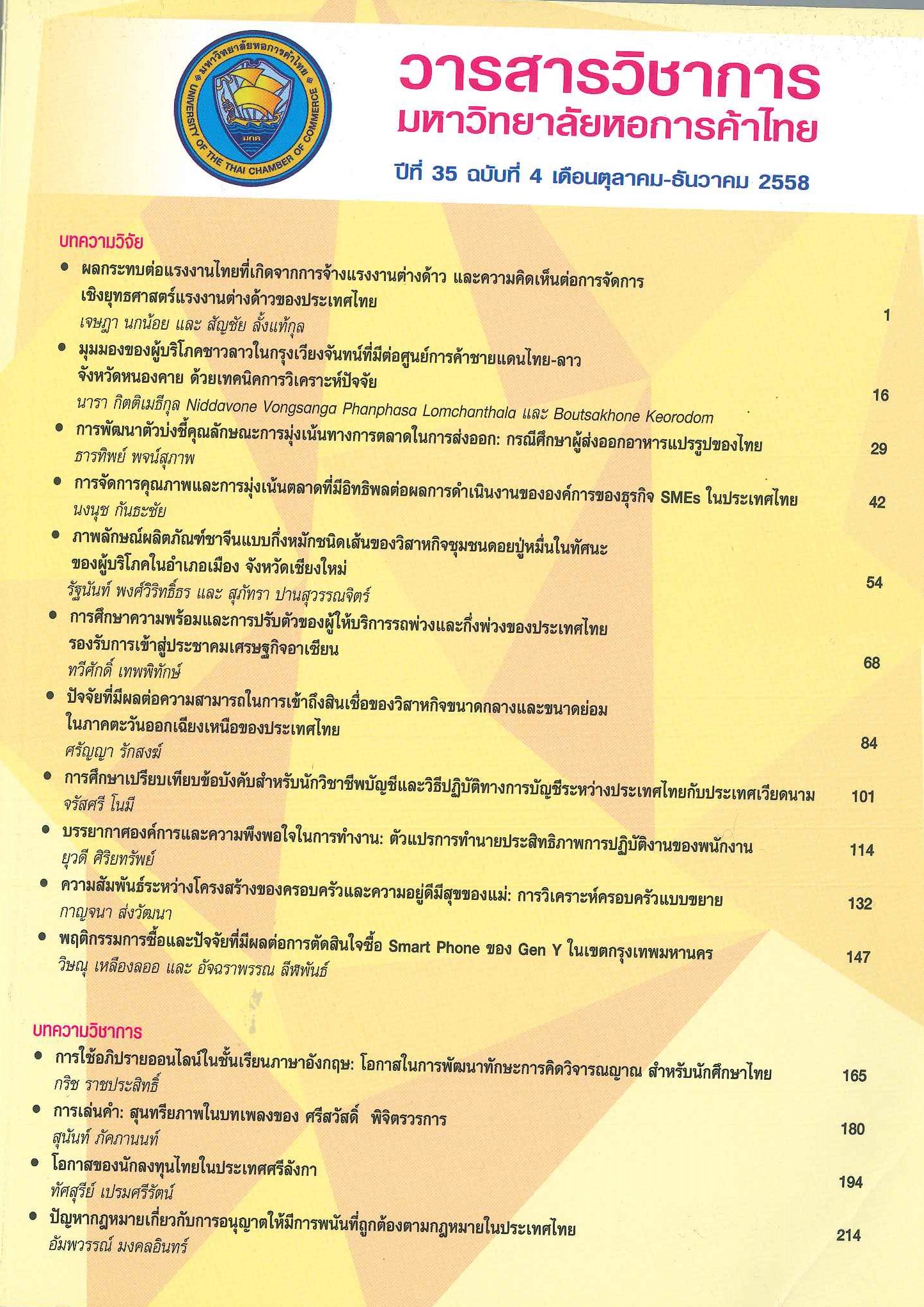Using Online Discussion in the English Language Classroom: An Opportunity to Develop Critical Thinking Skills among Thai Tertiary Students
Main Article Content
Abstract
The citizens of a global community need to be equipped with 21st Century skills, including the ability to think critically, in order to survive in an ever-changing world. Global citizens therefore need to develop skills in response to the requirements of the ‘community’. Specifically, critical thinking skills need to be cultivated, as theoretically these skills are not considered inherent, and therefore need to be developed and enhanced. The teaching method of applying online discussion in English language classrooms is recommended for students who are required to use these skills. This article aims to review and discuss the role of critical thinking skills, and the
possibility of developing these skills among Thai university students via English online discussion. The steps suggested below may provide ideas and guidelines for English education stakeholders, as well as their application in the language classroom.
Article Details
ลิขสิทธิ์ของบทความ
ผลงานที่ได้รับการตีพิมพ์ถือเป็นลิขสิทธิ์ของมหาวิทยาลัยหอการค้าไทย ห้ามมิให้นำเนื้อหา ทัศนะ หรือข้อคิดเห็นใด ๆ ของผลงานไปทำซ้ำ ดัดแปลง หรือเผยแพร่ ไม่ว่าทั้งหมดหรือบางส่วนโดยไม่ได้รับอนุญาตเป็นลายลักษณ์อักษรจากมหาวิทยาลัยหอการค้าไทยก่อน
References
Cheong, C.M. and Cheung, W.S. 2008. “Online Discussion and Critical Thinking Skills: A Case Study in a Singapore Secondary School.” Australian Journal of Educational
Technology 28, 5: 556-573.
Cheung, W.S. and Hew, K.F. 2005. “How Can We Facilitate Students’ In-depth Thinking and Interaction in an Asynchronous Online Discussion Environment? A Case Study.” In Proceedings of the AECT International Convention. Orlando, FL: AECT, pp.114- 121.
Chinedu, E. 2008. “Seven Benefits of Internet Forums.” Ezine Articles. [Online serial]. Available: http://ezinearticles.com/? Seven-Benefits-of-Internet-Forums&id=1813184
Chomphuchart, N. 2012. “Multiliteracies, Technology and English Language Teaching and Learning.” University of the Thai Chamber of Commerce Journal 33, 2: 214-228.
Gerbric, P. 2005. “Chinese Learners and Computer Mediated Communication: Balancing Culture, Technology, and Pedagogy”. In H. Goss (Ed.), Proceedings of the 22nd Annual Australian Society for Computers in Learning in Tertiary Education Conference: Balance, Fidelity, Mobility: Maintaining the Momentum?, pp. 241-251. Brisbane: Department Call for
Teaching and Learning Support Services, Queenslandsity of Technology.
Greig, M. and Skehill, C. 2008. “Increasing Staff and Student Capacity to Use the Communication Social Work Education.” The international journal 27, 6: 634-646.
Henri, F. 1992. “Computer Conferencing and Content Analysis.” In A.R. Kaye (Ed). Collaborative Learning through Computer Conferencing: The Najaden papers, pp. 117-136. Berlin: Springerrlag.
Hew, K.F. and Cheung, W.S. 2003. “Evaluating the Participation and Quality of Thinking of Pre-service Teachers in an Asynchronous Online Discussion Environment: Part II.” International Journal of Instructional Media 30, 4: 355-366
Holmes, K. 2004. Analysis of asynchronous online discussion using SOLO taxonomy. [Online serial]. Available: www.aare.edu.au/04pap/hol04863.pdf
Horton, S. 2000. Web Teaching Guide: A Practical Approach to Creating Course Web Sites. New Haven, London: Yale University Press.
Leston-Bandeira, C. 2009. “Using E-learning to Promote Critical Thinking in Politics.”ELiSS 1, 3: 1-14.
Lim, C.P. and Chai, C.S. 2004. “An Activity-
Theoretical Approach to Research of ICT Integration in Singapore Schools: Orienting Activities and Learner Autonomy.” Computers and Education 43, 3: 215-236.
MacKnight, C.B. 2000. “Teaching Critical Thinking through Online Discussions.” Educause Quarterly 4, 38-41.
Mandernach, B.J., Dailey-Herbert, A. and Donnelli-Sallee, E. 2007. “Frequency and Time Investment of Instructors’ Participation in Threaded Discussions in the Online Classroom.” Journal of Interactive Online Learning 6, 1: 1-9.
Mandernach, B.J., et al. 2009. “The Role of Instructor Interactivity in Promoting Critical Thinking in Online and Face-to-face Classrooms.” MERLOT Journal of Online Learning and Teaching 5,1: 49-62.
Miyazoe, T. and Anderson, T. 2010. “Learning Outcomes and Students’ Perceptions of Online Writing: Simultaneous Implementation of a Forum, Blog, and Wiki in an EFL Blended Learning Setting.” System Vol 38: 185-199.
Morris, S. and McCarty, B. 1990. 4 Mat in Action II. Barington, IL: Excel.
Newman, D.R., et al. 1997. “Evaluating the Quality of Learning in Computer Supported Cooperative Learning.” Journal of the American Society of Information Science 48, 6: 484-495.
O’Neill, P., et al. 2006. “Using Clinical Experience in Discussion with Problem-based Learning Groups.” Advances in Health Education 11, 349-363.
Peterson, C.L., and Caverly, D.C. 2006. “TechTalk: What Students Need to Know about Online Discussion Forums.” Journal of Developmental Education 29, 3: 40- 41.
Raktham, C. 2008. “Cultures and Learner Behaviors: A Qualitative Investigation of a Thai Classroom.” Doctoral dissertation, Centre for English Language Teacher Educaiton, University of Warwick.
Sanchez-Sweatman O.H. 2001. “Using Problem-based Learning in Distance Education.” In E. Rideout (ed), Transforming Nursing Education through Problem Based Learning pp. 311-324. Sudbury, MA: Jones and Bartlett Publishers.
Schafersman, S. 1991. An Introduction to Critical Thinking [Online serial]. Available: www.freeinquiry.com/critical-thinking.hmtl
Schellens, T. and Valcke, M. 2006. “Fostering Knowledge Construction in University Students through Asynchronous Discussion Groups.” Computer and Education 46, 1: 349-370.
Schuetze, U. 2010. “Motivation to Write Online: Chats and Forums.” GFL Journal 1, 3-24.
Scott, A. and Ryan, J. 2009. “Digital Literacy and Using Online Discussions: Reflections from Teaching Large Cohorts in Teacher Education.” In Joseph Zajda and Donna Gibbs (eds). Comparative information technology, pp 103-120, Dordrecht, Netherlands: Springer Science Business Media B.V.
Syque. 2014, 23 January. Socratic Questions. [Online serial]. Available: www. changingminds.org/techniques/ questioning/socratic_questions.htm

